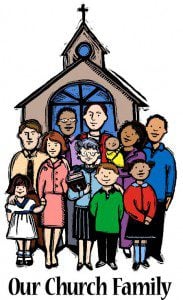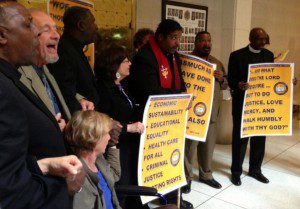 In an attempt to rally the old Religious Right during this election year, conservative political activists in North Carolina have named April 29 “Family Sunday.” Pulpits cannot be used to endorse a particular candidate in the United States, but the proposed Amendment One is a “nonpartisan” ballot issue. So churches are free to use up to 15 percent of their annual budget and all the airtime they want to tell their flocks how to vote on this measure. The organizers of “Family Sunday” have invested heavily in a campaign to convince Bible-believing people that a vote for Amendment One is a vote for biblical family values. They have won the support of the Roman Catholic bishop of North Carolina and the North Carolina Baptist State Convention. But they have not deceived the faithful at St. Johns Missionary Baptist Church here in Walltown. Folks here know the politics of the Old South too well to be taken in by this sort of trickery. (If you missed it, you can read my post on why I’m against Amendment One here.)
In an attempt to rally the old Religious Right during this election year, conservative political activists in North Carolina have named April 29 “Family Sunday.” Pulpits cannot be used to endorse a particular candidate in the United States, but the proposed Amendment One is a “nonpartisan” ballot issue. So churches are free to use up to 15 percent of their annual budget and all the airtime they want to tell their flocks how to vote on this measure. The organizers of “Family Sunday” have invested heavily in a campaign to convince Bible-believing people that a vote for Amendment One is a vote for biblical family values. They have won the support of the Roman Catholic bishop of North Carolina and the North Carolina Baptist State Convention. But they have not deceived the faithful at St. Johns Missionary Baptist Church here in Walltown. Folks here know the politics of the Old South too well to be taken in by this sort of trickery. (If you missed it, you can read my post on why I’m against Amendment One here.)
But in this historically black church and community, we also know that the family is in crisis. We are Bible-believing people who hold personal righteousness in high regard and challenge our members to be chaste, both in and out of marriage. We do not need a constitutional amendment to define marriage for us. We know a higher authority that has already declared, “What God hath joined together, let no man put asunder.”
Because our families face such enormous challenges, I welcome the idea of a “Family Sunday.” I take it on good faith that there are, indeed, millions of sisters and brothers in our state who want to spent this weekend working and praying for the good of all families. So in a spirit of hope and reconciliation, I wanted to share ten concrete ways churches can put faith into action for the sake of families, both this weekend and beyond.
- End the War on Drugs. When African-Americans remember the legacy of slavery in this country, they remember the horrible reality that family members could be separated and sold to different owners at any time. Though that terrible system is gone, vestiges of it remain in the criminal justice system that sees neighborhoods like ours as battlefields in the war on drugs. Despite the fact that rates of addiction and drug use are roughly the same in white and black communities, arrests for drug offenses are exponentially higher in the African-America community. In neighborhoods like ours, over half of young black men go to prison. Kids grow up without fathers as mothers struggle to raise them with limited support. Drugs are a problem, yes. But after 40 years, we know that “war” does not get rid of them. This war destroys our families, and it needs to end.
- Put Parents to Work. Though risk is high and returns are low, the drug trade is tempting in our neighborhood because jobs are so scarce. Especially for people who have already been convicted of a felony. We need creative job programs like Homeboy Industries, whose mission is “jobs not jails.” Programs like this take imagination and determination, but faith-communities are full of stubborn people who know that “God can make a way out of no way.” Our Governor, Bev Purdue, has celebrated the ingenuity of North Carolinians, noting that country folk with moonshine stills souped up their cars to drive fast during prohibition and so created NASCAR racing. It’s time to tap the energy of young men and women in neighborhoods like ours and create something we can be proud of. Let’s support NC families by sending parents to work instead of jail.
- Promote a Living Wage in Our State. Many of my neighbors are some of the most hardworking people I know. They rise early to drive a paper route before their day job. They do hard, manual labor that most middle class people don’t want to do. And some of them go to school at night so they can get the papers they need to get paid a little more. They work so much because their GED’s and high school diplomas typically bring $8-10 an hour. If you’re going to pay the bills and keep gas in the tank, you need a lot of hours at that rate. Even parents who care deeply about their kids can’t be with them because they’re working all the time. Christians can support families by paying a living wage in our own businesses and asking our neighbors to do the same in the name of justice.
- Ensure a Quality Education for All. The best way for families to break free from the generational cycles of poverty that make life so difficult is for kids to get a quality education that will prepare them for higher paying jobs. But our state has been investing less and less in public schools, opting to increase the number of charter schools that “perform better” but don’t provide lunch or busing from neighborhoods like ours. If we want to support families in North Carolina, our churches should promote quality, well-funded public education for all children.
- Re-examine “Traditional” Family. When we think of the “traditional” family, what we usually have in mind is mom, dad, and a couple of kids–the “picture-perfect” family of mid-20th century America. But if we read our Bible closely and pay attention to history, we can see that traditional families have been inter-generational partnerships in which an extended network of people worked together for the good of all. The family of Abraham and Sarah–just like the family of Jesus and his disciples–is a family that shares households, economic resources, and responsibilities. While we often call this “co-housing” today, what we’ve learned here in our neighborhood is that multiple income-earning adults who are united in the family of God can support one another and their children in ways that reduce the economic stress that so many families face as they try to make ends meet.
- Promote Family-friendly Work. Another way that families have traditionally been bound together is in daily work. Because most income-earning work is outside the home today, fewer families work together. We long for “family time” on vacations and weekends. But we overlook the money we could save (and the time we’d gain) by working together. Some ideas to promote at your church: plant a garden, host a yard sale, clean house together, bake bread, raise chickens, grow mushrooms, build bird houses, weatherize your home. (Fun fact: there are videos on the Internet that can show you and your kids step-by-step how to do most of these things.)
- Celebrate Local Entertainment. With the rapid advance of media technology, entertainment has become more and more individualized. Not only do people stay at home and watch TV. Often, each person in a household watches their own TV. Even when we’re out and about, people pop in their ear-buds and listen to music on an i-pod (I’ve taken to calling them “isolation pods”). Many have noted the way individualism reduces civic engagement. But I was struck recently by the observation of a community-organizer friend. She told me, that after years of struggling to get people out for events, she finally found the secret: invite a children’s choir to sing. “If the kids are there, the parents and grandparents will pack the place out.” What’s more, they might go get ice cream together afterward, as my family did after the concert at our son’s school this week. So, let’s encourage family activity by celebrating and hosting more kids choirs, open mics, block parties, and other local entertainment. (After all, some of the contestants on The Voice aren’t better singers than your neighbors anyway.)
- Practice Hospitality. Over the past decade, our extended family in this neighborhood has grown as we’ve hosted pot lucks each week and invited folks who needed a place to stay to come and live with us. We did it because our Bible told us to. “I was a stranger and you welcomed me,” Jesus said. We didn’t want to to miss him. But what we’ve found is that we now have a huge extended family of friends who’ve lived with us, who know and love us and our kids. If we want to promote family, we can do it by doing something else that Scripture requires: “practice hospitality, for in doing so some have entertained angels without knowing it.”
- Model Fidelity. When I teach kids in our neighborhood what the Bible says about sex–that its a gift to be received in a loving, committed relationship with a partner whom we can trust to share life with–they tell me that sounds good, but they haven’t seen it. What they hear on the radio is that sex is a good time. What they see in the movies is that it’s part of getting to know someone. What they’ve experienced, all too often, is parents who’ve not been able to be faithful to one another or to other subsequent partners. If Christians want to support and promote family values, we need to model fidelity, both in our marriages and in other relationships.
- Vote Against Amendment One. While some have been deceived, I don’t believe that Christians are as naive as conservative political activists believe. I don’t believe it because I speak to about 50 Christian conference, college, and church audiences a year. And when I tell them my own story of getting caught up in the Religious Right as a kid in the 1980’s only to realize that what was going on there wasn’t about bringing the kingdom of God, I get nods of recognition. We know we’ve been used by people who want power. And we know that Jesus has shown us a better way. I like how my friend and mentor Willie Jennings put it when speaking to a reporter this week:
Jennings said that Christians in North Carolina have long been inundated with the use of theological and biblical language to push forward political agendas. “Right now, several Baptists, rural Baptists and Catholics somehow believe this amendment supports their concern for healthy marriage,” he said. “Some believe, ‘This is in concert with our concern.’
Jennings said he hopes churches think that family, healthcare, education and better laws concerning violence against women are all crucial matters that churches should agree on and push forward. He said those are threats to marriage.
Indeed, Amendment One is a threat to marriage and families in North Carolina. So as we redouble our efforts to support all families this Sunday, I pray that sisters and brothers around the state will join us at St. Johns and say “no” to the politics of the Old South, “no” to laws that hurt families, and “no” to Amendment One.











